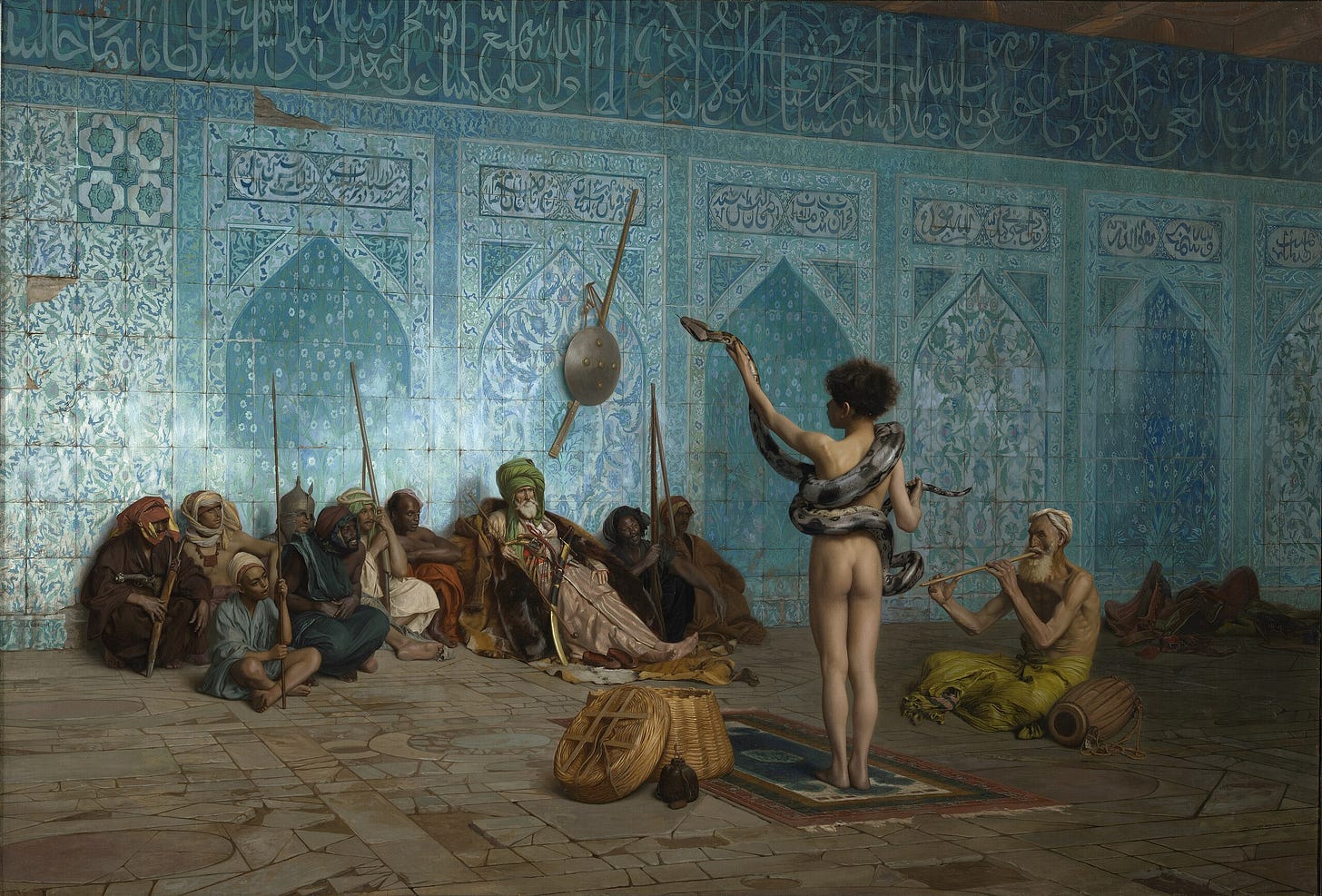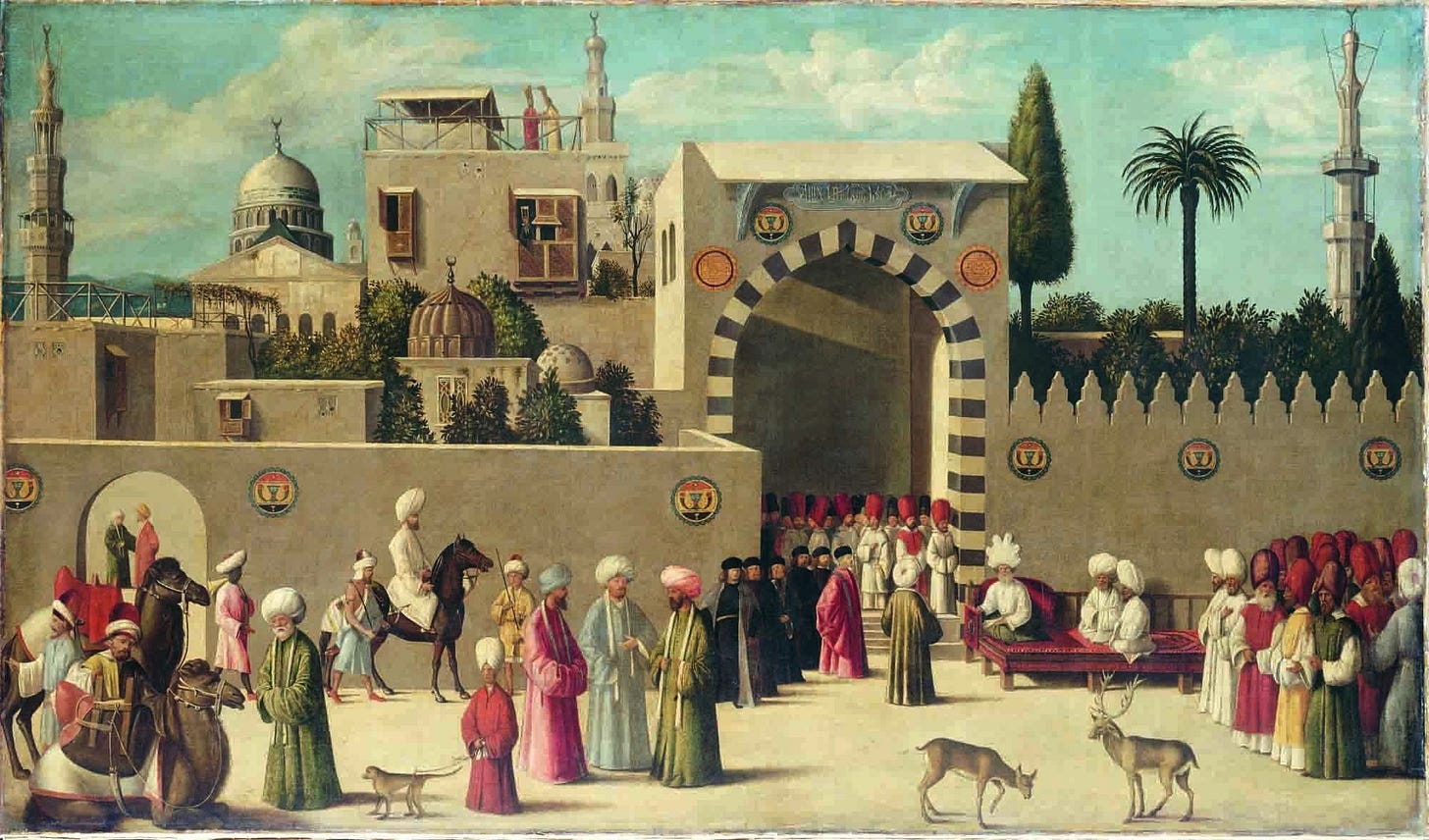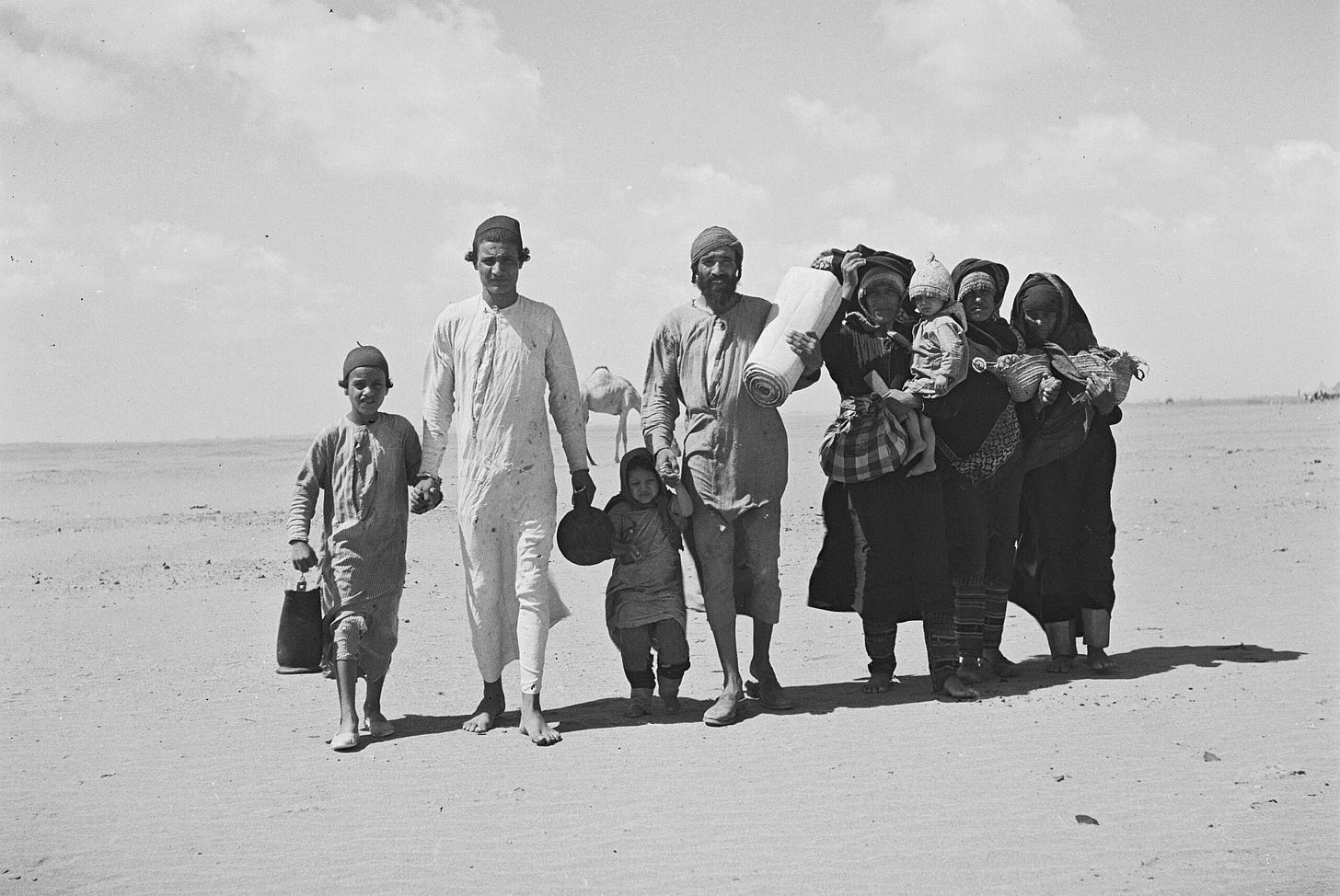We need to talk about the most influential academic fraud of the 20th century.
Palestinian-American Edward Said tried to create, out of thin air, an Arab equivalent to antisemitism. His book has been studied across the West for decades, even though it is complete rubbish.

Please consider supporting our mission to help everyone better understand and become smarter about the Jewish world. A gift of any amount helps keep our platform free of advertising and accessible to all.
This is a guest essay written by Tobias Gisle, who has a master’s degree in Middle Eastern Studies from Stockholm University.
You can also listen to the podcast version of this essay on Apple Podcasts, YouTube Music, YouTube, and Spotify.
When I used to be a standard Swedish “Critic of Israel,” I must again recount my shameful meeting with an Israeli peace activist. The one who felt compelled to inform me it wasn’t that the Palestinians were the good guys and the Israelis the bad guys — and then we could all go eat hummus.
The stupidity of my former understanding had been exposed for what it was: pure, bigoted nonsense. That moment was a turning point for me. I saw how useless the baseline European Left-wing activist position on this issue really is.
A few months ago, I came across the same activist’s Master’s thesis from Tel Aviv University in the 1990s. I was excited and wanted to see what this intelligent, thoughtful activist had to say. That’s when I noticed something odd. In the index, among the sources and quotations supporting her thesis were three different books by Palestinian-American political activist Edward Said and two books of French historian Michel Foucault. How wierd. Just like most of my fellow students at Stockholm University.
So, if it is in Tel Aviv University in the heady times of the peace process in the 1990s or Stockholm University in the raucous 2020s, the “father of the field” may not be ignored. In this world, it seems, his theories never die. Said and his 1978 book “Orientalism” form a kind of equivalent to the Bible for the religious or Das Kapital for Marxists. It shapes the field, laying the foundation just as securely as the base of a house allows the house to stand.
So is Said the great scion of academia that he seems to be? Does he deserve this title?
No. Indeed, one of the reasons for his popularity is a lot more sinister than you might think.
The theory of “Orientalism” holds that Westerners view “the Orient” — that is, the lands where Arabs and Muslims live — through a condescending, colonial, and racist lens. Said’s life work was to expose this gaze. His book dives deep into his own field, 19th-century literature, where he finds many literary giants such as Rudyard Kipling and Charles Baudelaire and “reveals” that these 19th-century men from colonial powers were — wait for it — rather pro-colonial in their thinking.
Shocking. I know.
He then wildly expands this “colonial way of thinking” to include politicians from his own time, such as former U.S. Secretary of State Henry Kissinger. For Said, it was all the same: Everyone looked down on Arabs and Muslims and created racist caricatures of “the Other.”
The special way that you can “find the meaning” according to Said, and track down the “real” intentions of the writers you have in your sights, came from Michel Foucault. Foucault’s “critical discourse analysis” is a way of working through text and finding key phrases that expose the meaning of a text. Now, I don’t want to poo-poo it completely. It isn’t all bad. Indeed, in my Master’s I did a “critical discourse analysis” on Al Jazeera, which opened my eyes to the sheer mastery they have of anti-Israel propaganda. The Qataris are on par with Joseph Goebbels.
One quibble I have with “critical discourse analysis” is that it plays the role of the “master of methods” in Middle Eastern Studies. I wanted to use other methods but was told in no uncertain terms that this was the preferred way of dealing with the Middle East, this kind of “detective of texts” method.
Much worse still is that both Foucault and Said didn’t come to the “critical discourse analysis” method with open hearts. Quite the opposite. They were not there to discover just anything at all about the text they were working on. They were there to “expose the power dynamic,” “dissect imperialism,” and “discover Orientalist thought.” This a priori decision to know what you are looking for gives you a pretty big incentive to start at the end and close your mind to other possibilities.
Quote-mining becomes a rather massive risk, where you take things out of context to prove some thesis or other. “Pink-washing” is an example of a useless theory that explains nothing, but is something you can come up with that makes sense if you start with the conclusion and work backwards to prove it.
The problems with “Orientalism” theory are also many. The leftist Lebanese intellectual Sadiq Jalal al-Azm pointed out immediately after publication that this theory could easily mean that, in accusing the entire Western intellectual world of racist stereotypes, one creates the very same stereotype of the West in one’s own black-and-white theory.
“Orientalism” is also shapeless; it has no structure at all, which is why it can be used on anybody. Therefore, you can easily do hit jobs on someone you don’t much care for. “Orientalism” seems to be simply a synonym for racism that focuses on people with Middle Eastern descent rather than African. Hey! That’s Said’s own descent. Incredible. What are the odds?
Racism, however, is a thing. But “Orientalism”? Not really. There are between 300 and 475 million Arabs in the world depending on how you count, 6 percent of the world population. They hold lands bigger than the United States. Are they really one group? Are people really specifically racist toward them and not, say, Indians?
The definitions just float away into nothingness once you get into the details. Again and again, the sweeping style and sheer revolutionary zeal of the theory simply mean that it is useless as a tool. Indeed the best scholars of the Middle East simply stay well away from this theory.
So, it never was a good theory, or good scholarship. One thing that “Orientalism” is though, is a hell of a read. It has that mix of iconoclastic irreverence; it paints with broad, easy-to-understand brush strokes; and it is titillating. These are not, however, the traits of great scholarship; they are the unmistakable traits of propaganda at its most persuasive.
When Said rides roughshod on giants like English journalist and novelist Rudyard Kipling and former British prime minister Benjamin Disraeli, whole generations of students could rubbish their parents’ heroes and call it oh so academic. When he put Kissinger in the same bucket as the authors of the colonial era, he became an instant hero of the anti–Vietnam War counterculture.
In other words, it gave a generation of “progressive” students exactly the kind of thing they were looking for, a new way to feel as if they were fighting the power from the very peak of Western academic life. Looking down on authority and calling them racist? Well, I like punk rock, so I understand the thrill.
Let me be more honest than most people like to be: Good writing is overrated. I say that as someone who loves to write and who would love for the words to come out well. But a well-written book can be a disaster. Just because you can write well doesn’t mean you tell the truth or do wonders for any particular field of study.
Noam Chomsky was a good writer. Ta-Nehisi Coates is a damn good writer. Hell, Sayyid Qutb (a leading member of the Muslim Brotherhood) was a good writer. So what? Being a good writer is like being a good sniper. If you are doing good or doing ill really depends on whom you are sniping. Good writing does a lot more damage than bad writing ever can.
All the thrilling anti-Imperialism in “Orientalism” might have come as news for Westerners, desperate to criticize their own governments after the wave of decolonization, and the ungraceful wars of Algeria and Vietnam fresh in people’s minds.

But for the Middle East, Said’s critique of the West was absolutely nothing new. Indeed, it was the standard view in the region for nearly two centuries, since Napoleon landed on the shores of Egypt. It is the classical problem of Arab intellectuals seeking the reason for Arab weakness vis-à-vis the West.
For this classical problem, Said had a classical answer — the same answer that happened to be the standard answer for Arab nationalists and Third Worldists at the time. For Said, the problem was not authoritarianism, not Islam, not poor education, not the dismal place of women in Arab society, and not the lack of a culture of innovation. Not at all. It was all the fault of imperialism, cultural and otherwise. How very convenient.
So not only was this a cudgel to clobber the West and Israel, it also sat very nicely indeed with how Arab despots saw the world. Whose fault is it? “Wasn’t me!” So sayeth Shaggy, the Assad family, Saddam Hussein, and Gamal Abdel Nasser. Said may have been an iconoclast for the West, but for the Arab and Muslim world, he was a bog standard revanchist. We need to change nothing and do nothing, it’s all their fault anyway.
The great test of the grand powers of prediction for both Michel Foucault and Said came just a year after the book was published. The Middle East was transformed for decades with the victory of radical Islam in the Ayatollah’s revolution in Iran in 1979. Said had said nothing on political Islam, and would never really have anything to say on the matter, apart from, of course, that it was very, very bad, wicked Orientalist behavior to criticize Islam in general and political Islam in particular.
While Said said nothing even vaguely helpful on the matter, his mentor Foucault did have a thing or two to say. Did he use his huge skill in gauging the “real meaning” of this time of revolution? Did he predict the Iranian colonialism of Hezbollah and Hamas? Did he predict the mass executions, the dress codes, and the “morality police”? No. He was instead blown away by the sweet words of the revolutionaries.
Despite only visiting Iran for a grand total of 15 days and not speaking Farsi, Foucault concluded that this was the kind of “spiritual revolution” that spoke to the “authenticity” that had been so sadly missing from the West since the French Revolution. For Foucault, the Ayatollah’s revolution was great news for the region. By completely misreading the tyranny and the disaster of the Islamic Republic, Foucault followed in the footsteps of the Iranian Left itself, which had been wooed into an alliance with the Islamists.
Once in power the Ayatollah regime proceeded, as we all know, to massacre the leftists. Then Foucault stopped writing about it. Well played.
Disastrously, and very much thanks to Foucault and Said, the left in the 2020s seem adamant to try and repeat the folly and follow the Islamists’ lead in the heart of the West itself.
So, why is this thoroughly debunked way of thinking still so prevalent in Middle Eastern studies, from 1990s Tel Aviv to 2020s Stockholm? One reason I have already mentioned is its readability. The other is well hidden but far worse. It wasn’t until I read American-Israeli historian Martin Kramer’s 2001 book “Ivory Towers on Sand” that I understood the true power of this worn-out, barely functional theory.
Said was, in his own admission, trying to conjure up a theory that Muslims and Arabs were looked down upon, just like the Jews had historically been looked down upon. “Orientalism” is the attempt to create, out of thin air, an Arab equivalent to antisemitism. The theory of “Orientalism” is a way of seizing the supposed “power of weakness” and trying to culturally appropriate it. This is what is so enticing about Said to generation after generation. This is it’s secret sauce.
It tells us that there is nothing special about the Jews. Nothing at all. Nothing special about the Holocaust, or the ethnic cleansing of Jews from Arab lands in the 19th and 20th centuries. Certainly not special enough for them to be entitled to their own state. Certainly not in their ancient homeland. Look, instead, at how Arabs are treated by the racists. Let us instead talk about this. Endlessly. This makes no sense historically, but makes all the sense in the world politically.

“Orientalism” and antisemitism blatantly have nothing to do with each other. As we have seen, “Orientalism” has no structure at all, while antisemitism has a very specific structure that is very easily identifiable. Antisemitism is the idea that the Jews stand in the way of liberation and redemption. “Orientalism” is just another, entirely superfluous, word for racism. Erasing Jewishness is nothing new. “Orientalism” theory is merely the latest iteration.
Why do a large majority of articles about Israel on Al Jazeera mention the al-Aqsa Mosque? Because the Dome of the Rock, part of the same complex, was built by Abd al-Malik ibn Marwan on the holiest site in Judaism — on Mount Moriah, which is now the site of the Temple Mount in Jerusalem, where Abraham is said to have prepared to sacrifice Isaac. Al-Malik wanted to show that Islam had erased the Jews and Judaism. That Jews are once again allowed to pray just a few hundred meters away is seen as an insult and a threat to Islam by Al Jazeera.
Why is the false accusation of genocide in Gaza repeated like a mantra against Israel? Because to do so erases the memory, scrubs away at the uniqueness, of the largest genocide in history, committed against the Jews.
The Middle East is not the only part of the world that endlessly complains about being hard done by the West, and nurses and nurtures a culture of revanchism and militarism against the mean West from inside dictatorships. This is an apt description of Russia. This is exactly Vladimir Putin’s ideology. All poor Russia needs is a little more space. A little more Lebensraum (the territory that a state or nation believes is needed for its natural development, especially associated with Nazi Germany) for the biggest country in the world.
Therefore, justice demands that it should be free to invade its neighbours at will. Most people in the West alternate between disbelief and fear at this ludicrous suggestion. Yet this is exactly what the Arab-led activism championed by Edward Said suggests. The reasoning is equally absurd. The reason that the Arabs and Muslims have such rubbish lives is that Arab lands used to be colonized long ago and that there is that terrible humiliation of there being a tiny Jewish state covering 0.17 percent of “Arab lands.” Instead of laughing in disbelief, we give Said and all his acolytes the best professorships in the lands of the West.
It’s high time we rid ourselves of this theory. Both Said and Foucault explain nothing and do nothing for the Middle East. The entire field needs a new paradigm. The real Middle East needs theories that challenge each and every phenomenon that hurts the people who live there: authoritarianism, oppression of women, reliance on oil, sectarianism, and of course political Islam and the other debunked, useless ideologies of the Middle East.
We don’t need any theories that blame Israel and the West for all the problems of the region. We certainly don’t need “Orientalism.” The idea is the theoretical equivalent to people insisting they are “anti-racist” while demonstrating at “pro-Palestine” events with Hamas flags fluttering and “Khaybar, Khaybar, ya Yahud!”1 filling the Autumn breeze.
Enough with the indulgence of this poison.
It means: “Khaybar, Khaybar, O Jews, Muhammad’s army will return.” — a reference to the 7th-century Battle of Khaybar, when Muhammad’s forces conquered the Jewish oasis of Khaybar in Arabia, killed its men, and enslaved its women and children.


The thing is, Kipling's view of the world is broader than Said's or Foucault's. His soul is more capacious. His work is richer, his vision keener. His prose is a million times more refined. There are complexities in his work that resist any critical discourse analysis. His understanding of Indian life is incomplete and biased but alive and nuanced. This contrasts sharply with Said's and Foucault's flat, soulless third-worldism. And it goes without saying that Kipling's personal conduct never plumbed the depths of Foucault's sexual exploitation of children.
You missed the point!!! Arab Islam is highly racist, supremacist and colonial!!!! They are using Goebbels' tactics: ''Accuse the other what you are guilty of''! That is their whole shtick and this is something that must be clearly stated to understand their evil game!!!!!!